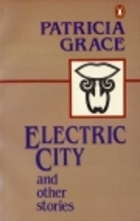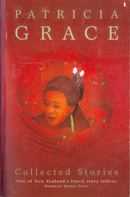
Electric City and Other Stories, originally published in 1987, is the third collection of short stories in Patricia Grace’s Collected Stories. I have previously reviewed Waiariki and Dream Sleepers, the other two collections.
I have enjoyed reading all three collections. Certain elements in thsese stories are familiar, like Grace’s use of oral storytelling and the incorporation of non-English (Maori) words in her prose. Other elements, specifically the portrayal of Maori island life, are like none that I’ve encountered anywhere in literature.
In Electric City, it is the role of the extended family, the whanau, which resonates most with me. In these stories, the whanau represents the foundation of community and the setting of cultural life and memory. In Grace’s view, the society survives and thrives if the whanau is present. An individual alienated from her whanau is quite literally lost, for the extended family also serves as a safe haven against threats both external and internal.
There are thirteen stories and flashes in Eclectic City; some are playful and some are serious. All center on domestic and seemingly mundane events. My favorites include:
- The Geranium, in which a young woman, isolated from her family is physically abused by her husband. This story was striking because it is not peopled by so many characters as the other stories are. One literally feels the absence of her whanau.
- Going for Bread, in which a young girl, Mereana, is bullied by two Pakeha girls, who themselves are victims of parental abuse. Mereana’s mother is a single parent, her father is absent, at some war. Mother and daughter seem isolated from their whanau:
“But there was something she knew now, something she’d made up her mind about. No one, ever gain, was going to push her kids in the gutter, cut them, muddy them, make them bleed. She would never send them out alone again, not for bread, not for anything. And one day the war would end.”
- The Hills – in which a teenage boy’s view of the world and his sense of self is shattered following an unlawful arrest and a night in a police station:
“later that day I went outside and walked up the street, and when I got to the top of the road I wouldn’t look out at the hills. The hills could’ve been clear, or the mist could’ve been down or it could’ve been lifting off. I turned and went back home. I remember wondering if I would ever look there again”.
- In Fishing, a woman is keen to catch one fish on the last day of summer, a metaphor for the anxiety inherent in cultural loss:
“Because if you don’t, it’s like you won’t any more… You have to still know, and you have to do enough…to carry you over. You have to be in there because you don’t want to be just waiting by the edge.”
 Collected Stories is a wonderful introduction to the works of Patricia Grace. She is a great story-teller and I’m spellbound by her short creations. She has also written six novels, so I can stay in her world a bit longer.
Collected Stories is a wonderful introduction to the works of Patricia Grace. She is a great story-teller and I’m spellbound by her short creations. She has also written six novels, so I can stay in her world a bit longer.
[…] Collected Stories by Patricia Grace (New Zealand) […]
LikeLike
[…] Electric City and Other Stories by Patricia Grace […]
LikeLike
[…] Electric City and Other Stories – Patricia Grace […]
LikeLike
I don’t think I’ve ever read a Maori author. Sounds interesting.
LikeLike
I tried a long time ago to read The Bone People by Keri Hulme, another Maori author. But I couldnt get past the first page. I’m hoping that the Grace stories have primed me for The Bone People 🙂
LikeLike
This sounds like a fantastic collection- thanks for telling us about it!
LikeLike
Interesting review! I really want to try some of her works now, maybe I can find the collection in my library.
LikeLike
I hope that you do find the collection at the library. If not, then try to see if yu can find her novels. I hear Potiki is good.
LikeLike
Another great review of Patricia Grace that reminds me that I need to read the book I have by her already 🙂 I love the idea of the the whanau and it sounds like an interesting focus for the collection. The stories you highlight are really intriguing.
LikeLike
Maybe we could do a read-a-long of her novels? hmm…
LikeLike
I’d be up for that! At the moment I only have Potiki – have you read it yet?
LikeLike
No, I haven’t. Will go dig it up and then we can set a date?
LikeLike
Do you have any books by the author yet to read? I could try to scrounge one of them up too 🙂
LikeLike
I have Potiki and I think Baba No-Eyes ( I have to check somewhere in the boxes).
LikeLike
I’ve added the other one to my potential buy list for Oct 1st. Can’t guarantee it will make the cut… but maybe 😀
LikeLike
I think you and I have some similar tastes – particularly in liking short stories and poetry – Kinna. I certainly like the sound of this. Sounds like it has some great variety.
LikeLike
I’m flattered if you think that we have the same tastes. I recommend that you try her works. Would love to hear what you think of her stuff.
LikeLike
Thanks for this Kinna… You read a lot and review a lot…
LikeLike
I try but I’m not nearly as prolific as Amy Reads.
LikeLike